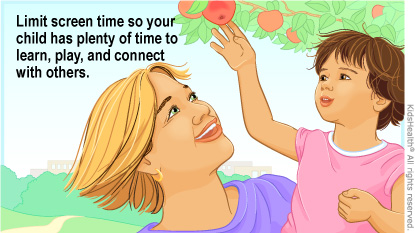Screen time (also called media use) is when someone is using a screen such as a computer, tablet, phone, TV, or other device. It includes activities such as videos, social media, texting, apps, and games. Screens are a big part of kids' lives, for learning, playing, and connecting with others. But too much screen time can make it hard for them to get enough physical activity and sleep, and to do other activities. These tips can help kids find a healthy balance.


General Screen Time Recommendations:
Build a family screen time plan. Work with your kids to set rules about screen time. These might include:
Help keep your child safe when using screens. Talk with your child often about the things they do online. Keep computers and devices in places where you can watch your kids use them. Check their browser history to see what they're looking up. Use kid-safe browsers, website blockers, and privacy settings to limit what your kids do online.
If you let your kids use social media, talk to them about how to use it safely. Good rules for social media include:


Is screen time bad for kids? Kids under 2 years old learn and develop best through real-life experiences. Although screen time isn't necessarily bad for young kids, it can take away from those learning opportunities. Screen time can help older kids learn and connect with friends, but too much can make them less physically active, limit how much they interact with people in real life, hurt sleep, and take time away from other things they enjoy. Social media and some online content can be violent, dangerous, sexual, or misleading. By knowing what your kids are doing online and encouraging them to set healthy limits on screen time, you can help them use screen time safely and wisely.
How can I manage screen use outside of our home? Ask how online safety is handled at your child's school, after-school center, friends' homes, or any place where your child could use a screen without your supervision.